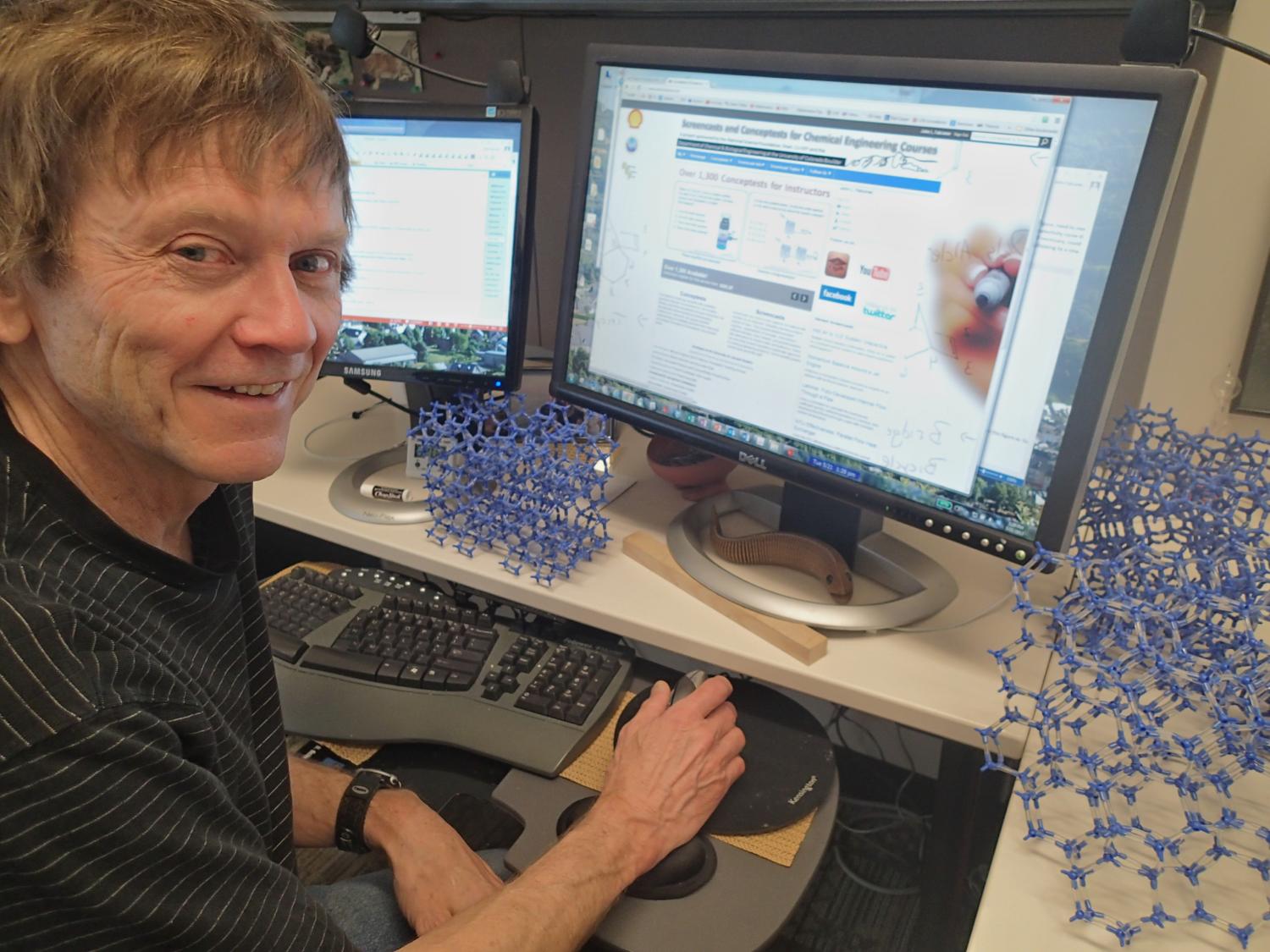ChBE Pioneers Active Learning Tools

ChBE has been on the forefront of innovative teaching for years. The department was an early adopter of student response systems (clickers), which have been used in some ChBE courses with ConcepTests and peer instruction for almost a decade. ConcepTests challenge students with qualitative questions that are not answered by memorization. More than 1,400 ChBE ConcepTests have been prepared in fields such as fluids, thermodynamics, and kinetics.
One champion of clickers and ConcepTests in ChBE courses has been Professor John Falconer, who was the featured educator in the Spring 2013 issue of Chemical Engineering Education. “Using ConcepTests and clickers totally changes the classroom and involves student much more in their learning. They also provide me with instant feedback on how much students understand,” says Falconer.
Screencasts, short video clips used to present material ranging from derivations to example problems, have also been a valuable tool for ChBE educators. Funding from the National Science Foundation, Shell, and the CU Engineering Excellence Fund has allowed ChBE educators to create over 800 screencasts which have been viewed or downloaded worldwide over 2 million times.
Interactive screencasts are now being prepared in which students must make decisions. These decisions will then take them to secondary screencasts that explain why their answers are correct or incorrect.
Screencasts have received an enthusiastic reception from students and professors across the country. Associate Professor William Jacoby (CU PhD ChemEng’93) from the University of Missouri recently broke his leg in the middle of the semester. Jacoby writes, “I was teaching Thermo, and I missed seven classes. I relied upon the LearnChemE site screencasts during this interval. Thanks for providing this valuable resource.”
Undergraduate ChBE senior Sai Radhakrishnan has utilized screencasts extensively during her years at CU. "I learned best by coupling the lecture notes with the example problems in screencasts,” said Radhakrishnan. “The screencasts pointed out areas that I needed to emphasize when studying. They also provided the correct logic to use when completing a range of problems. "
ConcepTests and screencasts have enabled flipped classrooms in ChBE courses. In a flipped classroom, students watch traditional lecture material in the form of screencasts before class. During class, where students have access to the help of the teacher and one another, instructors focus more on ConcepTests and in-class worksheets.
Some professors are also utilizing an active learning technique called TAPPS, which stands for “talking aloud pairs problem solving.” Pioneered by Professor James Stice at the University of Texas, the methodology behind TAPPS is that students can improve their analytical reasoning skills by verbalizing their problem-solving process. Paired students are given a problem; one student listens and asks questions while the other student talks through his or her solution to the problem. For the next problem, the roles are reversed.
“The theory behind TAPPS is that students can focus better on the steps required for problem solutions when they have to talk aloud to a peer,” says Professor Will Medlin, who has used TAPPS in his kinetics and thermodynamics courses. “TAPPS also offers a fun change-up from the usual format to help keep students engaged.”
A number of faculty now use tablet PCs to present in class. During lecture, they write directly on the screen and their class notes can then be posted online after class. Microsoft OneNote software is also used by some professors because it is more versatile than PowerPoint. Four faculty recently obtained NSF funding to develop complete course packages in OneNote that will eventually be shared with faculty at other universities.
While modernizing traditional classes, ChBE is also cognizant of the current trend towards online courses. Senior Instructor Janet deGrazia recently received EEF funding to create an online Material and Energy Balances course, and an online ChBE differential equations course is under consideration.
The faculty involved in these efforts have been presenting at various conferences to make others aware of the resources they have developed. Falconer and Medlin gave presentations at the ASEE Chemical Engineering Faculty Summer School at the University of Maine last July. Their presentations on screencasts and Falconer’s presentations on ConcepTests (with faculty from other universities) were the two most highly rated of the 23 workshops in terms of usefulness as determined by participants.

